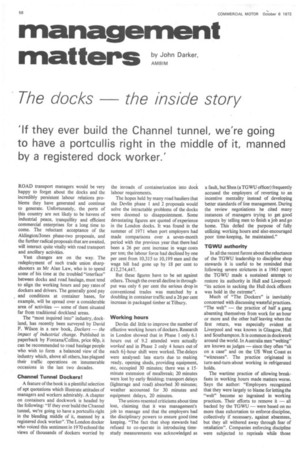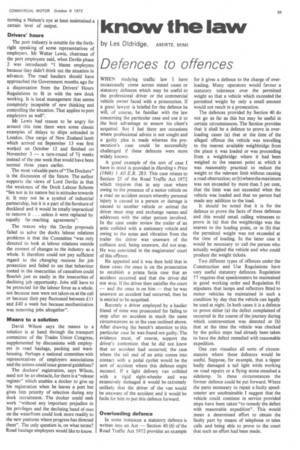management matters
Page 60

Page 61

If you've noticed an error in this article please click here to report it so we can fix it.
The docks the inside story
ROAD transport managers would be very happy to forget about the docks and the incredibly persistent labour relations problems they have generated and continue to generate. Unfortunately, the ports of this country are not likely to be havens of industrial peace, tranquillity and efficient commercial enterprises for a long time to come. The reluctant acceptance of the Aldington/Jones phase-two proposals, and the further radical proposals that are awaited, will interact quite vitally with road transport and ancillary activities.
Vast changes are on the way. The redeployment of such trade union sharpshooters as Mr Alan Law, who is to spend some of his time at the troubled "interface" between docks and road haulage, must tend to align the working hours and pay rates of dockers and drivers. The generally good pay and conditions at container bases, for example, will be spread over a considerable area of activities — some of them situated far from traditional dockland areas.
The "most inquired into" industry, dockland, has recently been surveyed by David F. Wilson in a new book, Dockers — the impact of industrial change. Published in paperback by Fontana/Collins, price 60p, it can be recommended to road haulage people who wish to form a balanced view of the industry which, above all others, has plagued their traffic operations on innumerable occasions in the last two decades.
Channel Tunnel Dockers!
A feature of the book is a plentiful selection of apt quotations which illustrate attitudes of managers and workers admirably. A chapter on containers and dockwork is headed by the following: "If they ever build the Channel tunnel, we're going to have a portcullis right in the bleeding middle of it, manned by a registered dock worker". The London docker who voiced this sentiment in 1970 echoed the views of thousands of dockers worried by the inroads of containerization into dock labour requirements.
The hopes held by many road hauliers that the Devlin phase 1 and 2 proposals would solve the intractable problems of the docks were doomed to disappointment. Some devastating figures are quoted of experience in the London docks. It was found in the summer of 1971 when port employers had made comparisons over a seven-month period with the previous year that there had been a 26 per cent increase in wage costs per ton; the labour force had declined by one per cent from 10,315 to 10,199 men and the wage bill had gone up by 18 per cent to £12,274,447.
But these figures have to be set against others. Though the overall decline in throughput was only 6 per cent the serious drop in conventional trades was matched by a doubling in container traffic and a 26 per cent increase in packaged timber at Tilbury.
Working hours Devlin did little to improve the number of effective working hours of dockers. Research in London showed that in Phase I only 6.1 hours out of 9.2 attended were actually worked and in Phase 2 only 4 hours out of each 6+-hour shift were worked. The delays were analysed: late starts due to making ready, opening sheds, providing equipment, etc, occupied 30 minutes; there was a 15minute extension of mealbreak; 20 minutes were lost by early finishing; transport delays (lighterage and road) absorbed 30 minutes; weather accounted for 30 minutes and equipment delays, 20 minutes.
The unions resented criticisms about time lost, claiming that it was management's job to manage and that the employers had the disciplinary powers to ensure good time keeping. "The fact that shop stewards had refused to co-operate in introducing timestudy measurements was acknowledged as a fault, but Shea (a TGWU officer) frequently accused the employers of reverting to an incentive mentality instead of developing better standards of line management. During the review negotiations he cited many instances of managers trying to get good outputs by telling men to finish a job and go home. This defied the purpose of fully utilizing working hours and also encouraged poor time-keeping, he maintained."
TGWU authority
In all the recent furore about the reluctance of the TGWU leadership to discipline shop stewards it is useful to be reminded that following severe strictures in a 1965 report the TGWU made a sustained attempt to restore its authority in Hull and Liverpool: "its action in sacking the Hull dock officers was bold in the extreme".
Much of "The Dockers" is inevitably concerned with discussing wasteful practices. "The welt" — the practice of half a gang absenting themselves from work for an hour or more and the other half leaving when the first return, was especially evident at Liverpool and was known in Glasgow, Hull and Southampton. It is common in dockwork around the world. In Australia men "welting" are known as judges — since they often "sit on a case" and on the US West Coast as "witnesses". The practice originated in turn-and-turn-about working in refrigerated holds.
The wartime practice of allowing breakfasts in working hours made matters worse. Says the author: "Employers recognized that they were largely to blame for letting the "welt" become so ingrained in working practices. Their efforts to remove it — all backed by the TGWU — were based on no more than exhortation to enforce discipline, collectively if necessary, against absentees, but they all withered away through fear of retaliation". Companies enforcing discipline were subjected to reprisals while those turning a Nelson's eye at least maintained a certain level of output.
Drivers hours The port industry is notable for the forthright speaking of some representatives of employers. Mr Walter Lewis, chairman of the port employers said, when Devlin phase 2 was introduced: "I blame employers because they didn't think out the situation in advance. The road hauliers should have approached the Government months ago for a dispensation from the Drivers' Hours Regulations to fit in with the new dock working. It is local management that seems completely incapable of new thinking and controlling the situation. That applies to port employers as well".
Mr Lewis had reason to be angry for around this time there were some classic examples of delays to ships unloaded in London. One cargo of New Zealand lamb which arrived on September 13 was first worked on October 12 and finished on November 3 — a turn-round of 7+ weeks instead of the one week that would have been normal three years earlier.
The most valuable parts of "The Dockers" is the discussion of the future. The author supports the views of Lord Devlin in that the weakness of the Dock Labour Scheme "lies not in its nature but in attitudes towards it. It may not be a symbol of industrial partnership, but it is a part of the furniture of dockland and it would be totally impractical to remove it . . . unless it were replaced by equally far-reaching agreements".
The reason why the Devlin proposals failed to solve the docks labour relations problems is that the Committee "was only directed to look at labour relations outside the context of changes to the industry as a whole. It therefore could not pay sufficient regard to the changing reasons for job protection and failed to see that behaviour rooted in the insecurities of casualism could flourish just as easily in the insecurities of declining job opportunity. Jobs still have to be protected for the labour force as a whole. not because men were not taken on at the call or because their pay fluctuated between £11 and £40 a week but because mechanization was removing jobs altogether".
Means to a solution David Wilson says the means to a solution is at hand through the transport committee of the Trades Union Congress, supplemented by discussions with employers in road haulage, packing and warehousing. Perhaps a national committee with representatives of employers associations and the unions could issue general guidelines?
The dockers' registration, says Wilson, need not be an obstacle, for there is a "release register" which enables a docker to give up his registration when he leaves a port but gives him priority of selection during any dock recruitment. The docker could seek work "without any important prejudice to his privileges and the declining band of men on the waterfront could look more readily to the new pastures where progress has directed them". The only question is, on what terms? Road haulage employers would like to know.






































































































